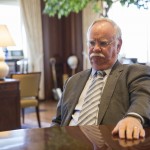At the beginning of his term, Boston Mayor Martin Walsh pledged to work closely with the Boston City Council to achieve better communication and stronger collaboration. The parties’ interactions have been positive and negative at times, holding opposing viewpoints on certain issues and raising different arrangements and solutions to resolve those issues.
Most recently, Walsh rejected the Council’s proposal of a commission advocating for black and Latino men and boys in November.
Bill Linehan, president of the Council, said Councilor Tito Jackson initiated the proposal in February.
“There are enormous problems that disproportionately impact minority communities, from violence and unsolved murders to underemployment to substance abuse,” Linehan said in an email. “This is an issue all levels of government are working on collaboratively.”
When this commission was proposed, Walsh had already joined the City of Boston with U.S. President Barack Obama’s My Brother’s Keeper Initiative. The initiative focused on a mission to reach out to minority males from an early age through adulthood.
In October, Walsh vetoed the Council’s proposal for a pay increase in their salaries. The Council voted 9-4 for a raise of $20,000, which would result in a $107,500 yearly pay.
Soon after, Walsh reconstituted the City of Boston Compensation Advisory Board, announcing five new appointed officials as members.
“I have full confidence in the judgment and expertise of the members of this board,” he said in a Nov. 17 press release. “They will look at every parameter affecting salaries for elected and appointed officials.”
The newly constituted Compensation Advisory Board is expected to have a report on the Council’s salaries by February, according to the release.
Deborah Shah, president of the advisory board, said the board’s work has just begun with their open meetings.
“Our report will be filed with the Council and will be public information,” she said in an email. “Information will be public when we conclude our work some months from now.”
In June, a change in the residency requirement by Walsh also caused hesitant responses from the Council. The proposal required top city officials to move into the city within the course of six months.
“We have city employees who are never required to live in Boston, city employees required to maintain residency for 10 years and city employees required to live in Boston for their entire city careers,” Linehan said. “Residency requirements make a lot of sense in some instances. I wouldn’t want an elected official representing a district he or she did not live in. In other instances, residency requirements might be something we need to look at changing.”
The Council approved the revised version of the residency requirement on June 16, with an extension from six months to one year for city officials to move into the city.
Linehan said compromise is necessary for a functioning democracy and that the spirit of collaboration is fundamental to ensure cooperation.
“At times, we may disagree on specifics, but the mayor and the Council cooperate and collaborate on virtually everything,” Linehan said. “He understands that the Council is a vital partner in government, and I look forward to continuing to work closely with Mayor Walsh.”
Kate Norton, spokeswoman for the City of Boston, said Walsh has built a strong and productive relationship with the Council in just the first 11 months of his administration.
“Mayor Walsh, members of his cabinet and his Intergovernmental Relations personnel meet regularly with all Councilors,” she said in an email. “Boston residents are represented by both the Mayor and the Council, and this has strong engagement and exchange over various issues — and that’s exactly how it should work.”
Several residents said they are hopeful that debate between Walsh and Council will heed the best results for the city.
Alexei Rodriguez, 40, of Roslindale, said although there may be issues between the two parties, he is trying to remain optimistic.
“He [Walsh] has got big shoes to fill, and I feel like in general, American politics tend to be very corrupt, and I feel like Boston had a little bit more than a tradition of keeping an eye on that,” he said. “I’m a teacher in a primary school, but we have a bigger school reach that includes middle school, and I know that they did switch the school transportation, but not for all students. As a parent, I would be a little concerned though.”
Alexandra Caporale, 32, of Brighton, said she disagreed with the councilors’ raise proposal.
“I don’t get paid very well, and I can’t imagine having a $20,000 raise for myself,” she said. “So I kind of prefer that money go to things to help the people’s business and maybe give other people small raises.”
Marcy Constance, 30, of the North End, said she likes the fact the people have different opinions and are allowed to express themselves.
“I hope for more people working together and to be open to new opinions,” she said. “I’m fine with it as long as they put the importance of the city of Boston first in their decision.”















Stenograph Record from the Public Meeting of Boston City Council
http://citystenographboston.blogspot.com/